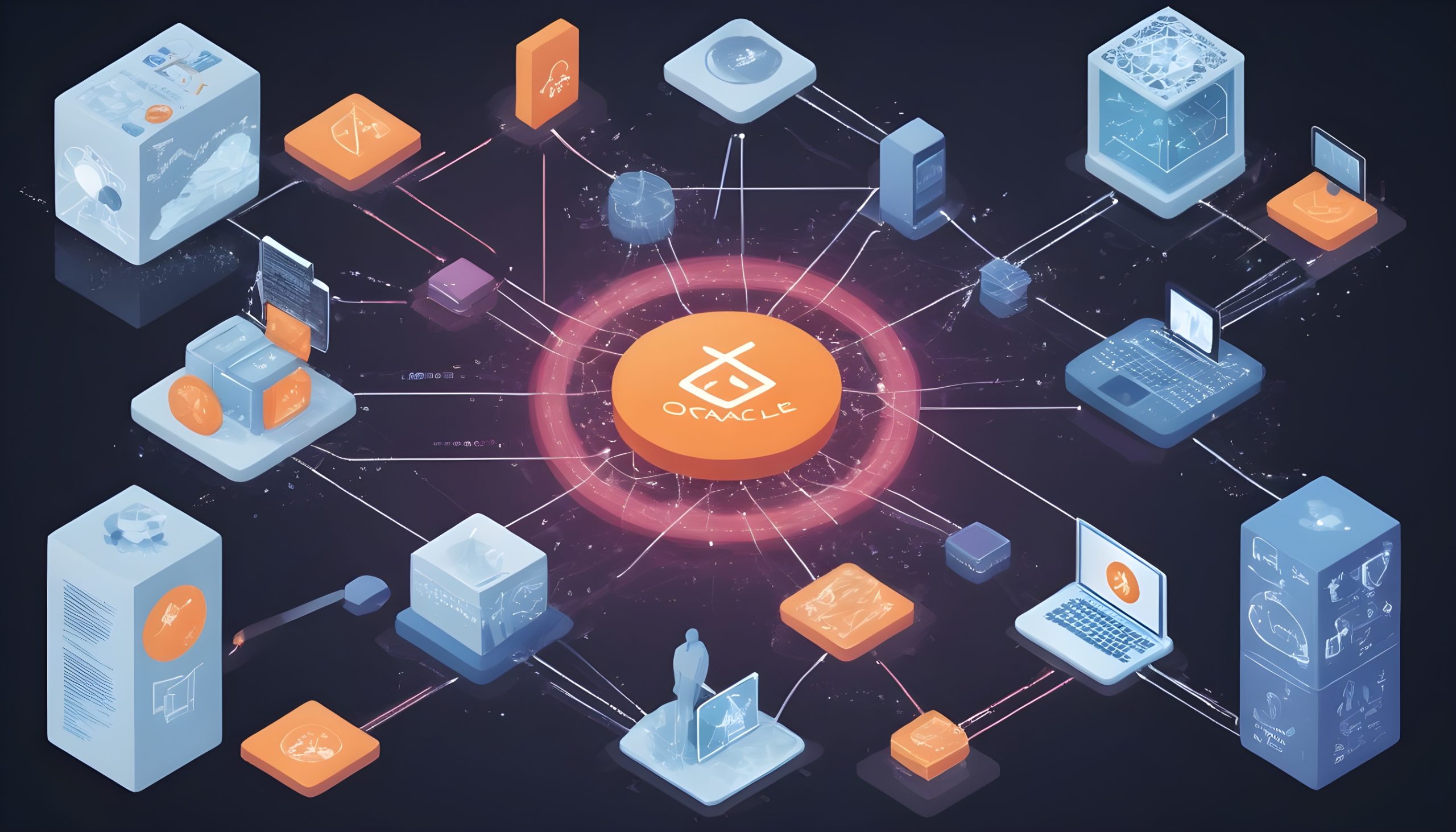Introduction
Smart contracts, the backbone of blockchain technology, are programmable contracts that execute automatically when predefined conditions are met, eliminating the need for intermediaries. However, their functionality is not limited to the blockchain alone; oracles serve as bridges between smart contracts and real-world data, enabling them to interact with external sources.
Essentially, oracles unlock the full potential of smart contracts by extending their reach beyond the blockchain’s confines, driving innovation, and enabling the creation of decentralized applications across various industries. Without oracles, smart contracts would be constrained to internal data, limiting their capabilities and hindering the evolution of the decentralized Web 3.0 ecosystem.
Understanding Oracles
What are oracles?
Due to the closed nature of blockchains, oracles serve as intermediaries, facilitating the flow of real-world data into the blockchain ecosystem. They enable smart contracts to access external information beyond the blockchain’s internal data. Some prominent oracles today include Chainlink, Band Protocol, Tellor, and Augur, among others.
Types of Oracles
Oracles can be categorized based on their function or design. Here are a few examples:
- Software-based oracles: One category of oracles is software-based oracles. These oracles are designed to provide real-time data from digital sources like APIs, databases, websites, servers, and more. An example of data that can be delivered by a software-based oracle is the exchange rate.
- Hardware-based oracles: Another type of oracles are hardware-based oracles. These oracles are capable of extracting real-world data from physical devices such as motion sensors, RFID, barcode scanners, cameras, and more. They are particularly useful when developing applications that require physical measurements or real-time monitoring.
- Inbound oracles: The most prevalent types of oracles in terms of data flow are inbound oracles. These oracles are crucial in bringing external data onto the blockchain, enabling smart contracts to utilize and interact with it.
- Outbound oracles: Outbound oracles, similar to their inbound counterparts, perform an essential function in the blockchain ecosystem. However, they operate in a reverse manner. Outbound oracles facilitate the transmission of data from smart contracts on the blockchain to the external world. This enables the blockchain to interact with and impact real-world systems and processes.
- Human-based oracles: Human-based oracles are a valuable category within the realm of oracles. They offer subjective data that is challenging to outsource or obtain through automated processes. These oracles rely on human input, such as legal judgments or artistic evaluations, to provide insights and perspectives that cannot be easily replicated by machines. Human-based oracles ensure that the human element is incorporated into blockchain applications, adding a unique dimension to the data and decision-making processes.
How Oracles work
- Gathering external data
A smart contract gets triggered automatically or by a user and requests specific data while specifying parameters such as source or timeframe from the outside world.
- Transmitting data to smart contracts
The data requested by the smart contract is acknowledged by the oracle’s data providers and then the data is retrieved from an external source like an API. The data is sent back to the smart contract through a secured channel.
- Verifying data integrity and authenticity
To ensure accuracy and prevent tampering, most oracles implement consensus mechanisms that validate the retrieved data. These mechanisms are designed to guarantee the integrity of the data provided by Oracle, giving users confidence in its reliability.
The Need for Oracles in Smart Contracts
Smart contracts may not realize their full potential when they rely solely on data from the blockchain. Oracles play a pivotal role in enhancing the real-world utility of smart contracts, enabling applications in areas such as supply chain management, decentralized insurance, and prediction markets.
By ensuring the delivery of valid and accurate data to smart contracts, oracles enhance transparency, fostering increased adoption and trust in blockchain-based solutions.
Moreover, the data provided by oracles empowers smart contracts to automate complex tasks, leading to improved efficiency and decreased reliance on manual intervention. This synergy between oracles and smart contracts holds great potential for streamlining operations and driving innovation in various industries.
Examples of use cases that require oracles
- Decentralized finance (DeFi): Oracles empower DeFi by providing secure and reliable price feeds for several assets. These price feeds are utilized by lending platforms to determine collateralization ratios accurately. Oracles also play a crucial role in other DeFi products like automated market makers and decentralized derivatives. Their involvement ensures the availability of accurate and up-to-date information for these financial protocols, enhancing their efficiency and reliability. By seamlessly integrating real-world data into DeFi applications, oracles contribute to the growth and success of this innovative ecosystem.
- Insurance contracts: In decentralized insurance, oracles can be instrumental in providing weather data to trigger payouts for flight delays. By leveraging oracles, delays, and human errors can be minimized, ensuring that insurance claims are processed accurately and efficiently.
- Supply chain management: Oracles play a vital role in enabling and enhancing various aspects of tracking goods, automating payments, and detecting counterfeit items. By retrieving relevant data from external sources, oracles provide valuable information that can be used to track the movement of goods throughout the supply chain.
- Voting systems: By leveraging oracles, the process of voting can be made secure and transparent. Oracles can be used to verify the identity of voters and record their votes on the blockchain.
Challenges and Risks Associated with Oracles
- Data reliability and accuracy
When data provided by oracles are compromised, they may have severe consequences. As a result, comprehensive consensus mechanisms and secure data feeds are necessary.
- Oracle centralization and security
Centralized oracles can present a potential single point of failure as they are controlled by a single entity and act as the sole provider of data for smart contracts. To address this issue, decentralized oracles utilize blockchain mechanisms by distributing trust among multiple participants. By doing so, they enhance the level of security and reliability.
Oracle Solutions and Projects
Below are some of the leading Oracle projects in the blockchain space:
- Chainlink: Chainlink is a decentralized platform that connects existing systems to a public and private blockchain. The Oracle network provides tamper-proof data to support smart contracts on different blockchains.
- Band Protocol: Band Protocol is an Oracle network that aggregates and connects data from the outside world and APIs to smart contracts running on several blockchains.
- Tellor: Tellor is an Oracle protocol that supplies smart contracts with any kind of data in a permissionless and transparent manner.
Future Outlook and Potential Developments
The following are emerging trends in Oracle technology as of today:
Decentralization: There is a significant focus on decentralizing oracle networks to address the limitations of centralized oracles. The primary objective is to eliminate the risks associated with a single point of failure and enhance the overall level of trust in the system.
Scalability: Earlier blockchains faced challenges with scalability, which prompted the development of newer blockchain solutions focused on addressing this issue. The shift towards more scalable blockchains also has implications for Oracle Solutions. As these blockchains handle larger volumes of data requests, Oracles will need to adapt and efficiently handle the increased workload while maintaining low latency.
Cross-chain oracles: The rapid development of blockchains has resulted in the emergence of distinct and separate blockchain networks. Consequently, cross-chain oracles have become indispensable in facilitating the exchange of data and communication between these different blockchains. Cross-chain oracles serve as the bridge that enables interoperability and seamless interaction between these diverse blockchain ecosystems.
Integration of oracles with layer 2 scaling solutions
A layer2 blockchain may be described as a supplementary off-chain network residing on a blockchain (also known as layer 1) to expand the parent blockchain’s capabilities. Layer 2 solutions help address the scalability issues faced by older blockchains. Integrating Oracles with layer 2 allows the development of DeFi applications by leveraging the Oracle’s price feeds. For example, Optimism which is an Ethereum layer 2 scaling solution integrated Chainlink’s low-cost price feeds to empower dApps.
Oracles play a crucial role in driving the widespread adoption of smart contracts by facilitating the retrieval of real-world, reliable, and tamper-proof data feeds and events. By leveraging oracles, smart contracts gain the ability to execute and automate complex transactions, ensuring efficiency and trust in the process.
Conclusion
In summary, the integration of oracles is essential for unlocking the full potential of smart contracts by bridging the gap between blockchain networks and real-world data sources. Oracles enable the execution of complex agreements and automated processes across various industries, from decentralized finance to supply chain management.
While challenges like data reliability and oracle centralization exist, ongoing innovation and the development of decentralized oracle networks aim to address these issues. As blockchain technology matures and gains wider adoption, the role of oracles will become increasingly vital, opening up new possibilities and applications in diverse sectors. Embracing the potential of oracles not only enhances smart contract functionality but also drives the advancement and widespread acceptance of blockchain technology as a whole.
















